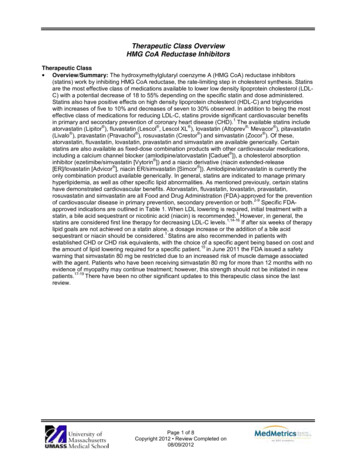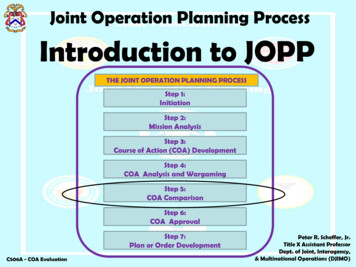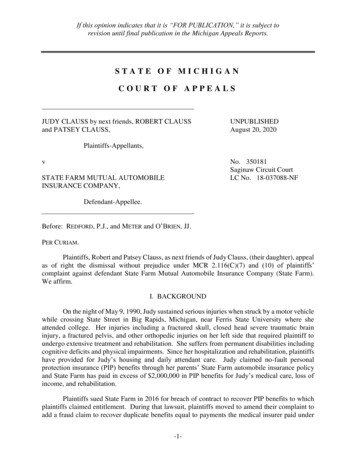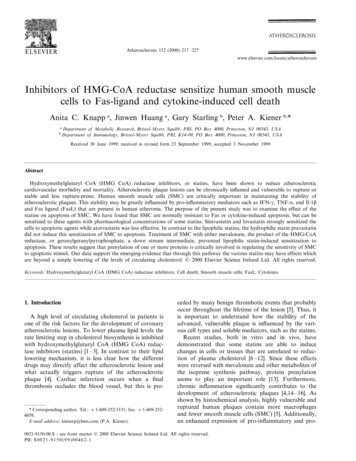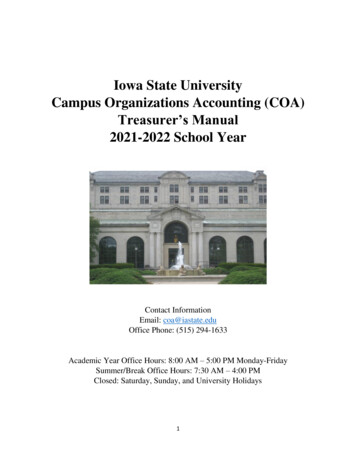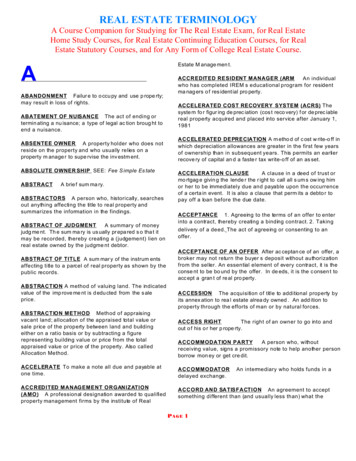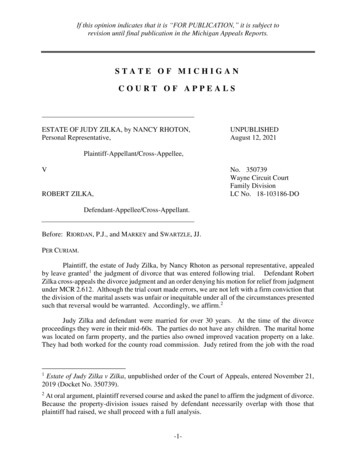
Transcription
If this opinion indicates that it is “FOR PUBLICATION,” it is subject torevision until final publication in the Michigan Appeals Reports.STATE OF MICHIGANCOURT OF APPEALSESTATE OF JUDY ZILKA, by NANCY RHOTON,Personal Representative,UNPUBLISHEDAugust 12, 2021Plaintiff-Appellant/Cross-Appellee,VNo. 350739Wayne Circuit CourtFamily DivisionLC No. 18-103186-DOROBERT ZILKA,Defendant-Appellee/Cross-Appellant.Before: RIORDAN, P.J., and MARKEY and SWARTZLE, JJ.PER CURIAM.Plaintiff, the estate of Judy Zilka, by Nancy Rhoton as personal representative, appealedby leave granted1 the judgment of divorce that was entered following trial. Defendant RobertZilka cross-appeals the divorce judgment and an order denying his motion for relief from judgmentunder MCR 2.612. Although the trial court made errors, we are not left with a firm conviction thatthe division of the marital assets was unfair or inequitable under all of the circumstances presentedsuch that reversal would be warranted. Accordingly, we affirm.2Judy Zilka and defendant were married for over 30 years. At the time of the divorceproceedings they were in their mid-60s. The parties do not have any children. The marital homewas located on farm property, and the parties also owned improved vacation property on a lake.They had both worked for the county road commission. Judy retired from the job with the road1Estate of Judy Zilka v Zilka, unpublished order of the Court of Appeals, entered November 21,2019 (Docket No. 350739).2At oral argument, plaintiff reversed course and asked the panel to affirm the judgment of divorce.Because the property-division issues raised by defendant necessarily overlap with those thatplaintiff had raised, we shall proceed with a full analysis.-1-
commission in late 2011 or early 2012 due to poor health. Defendant also retired from his job withthe road commission, but afterwards he worked as an independent contractor and later acceptedemployment with the local township. Defendant was working full-time for the township as of thedate of trial. The parties accumulated numerous assets during the marriage and received incomefrom employment, governmental, and retirement-related sources. Doctors diagnosed Judy withamyotrophic lateral sclerosis (ALS) in August 2017. Defendant became her caregiver, attendingto her basic needs. But there was also evidence that defendant verbally, emotionally, andphysically abused Judy throughout the marriage, including after her ALS diagnosis, leading to aconviction for domestic violence. Judy filed for divorce in March 2018, and in January 2019,Rhoton, Judy’s sister, was appointed guardian and conservator for Judy because of her failinghealth. Home-health aides provided Judy with round-the-clock care. In March 2019, the trialcourt conducted a three-day bench trial. The focus of the trial was on the division of the maritalassets and estate. On April 3, 2019, the trial court entered a judgment of divorce. Judy died onApril 14, 2019.The trial court awarded the parties’ vacation lake house to defendant, along with all of thepersonal property located at the lake house.3 The trial court ordered defendant to take out a loanagainst the lake house in the amount of 163,000, which was to be used to pay 125,000 to Judy, 38,000 in various attorney fees,4 and 50% of any fees associated with the preparation of aQualified Domestic Relations Order (QDRO). The trial court awarded Judy a life estate interestin the marital home, while granting defendant a remainderman interest.5 The court also grantedJudy a life estate interest in the personal property located at the marital home and on the farm.Defendant was awarded a remainderman interest in the marital-home personal property. The trialcourt awarded Judy a horse trailer, a van equipped with features for the handicapped, a deferredcompensation retirement account held by defendant (by QDRO), her county retirement plan, andany checking and savings accounts currently in her name. The court made her responsible for anycredit card or unsecured debts that were solely in her name. The trial court awarded defendantfarm and excavation equipment that was not presently located at the marital home or farm, a pickuptruck, a van, a Grand Torino, a defined benefit account, an IRA, a Roth retirement savings account,and his county retirement plan. Defendant was ordered to assume full liability on any joint debtaccounts, which included a 75,000 balance on the mortgage (home equity line of credit) coveringthe marital home.6As calculated and found by the trial court, the net value of the marital estate was 721,200and the division of the real and personal property recited above resulted in defendant’s receiving3Our discussion in this paragraph is premised on the terms of the judgment of divorce.Of the 38,000, 10,000 was to be paid to defendant’s own attorney and 28,000 to cover thefees of Judy’s attorney.45The trial court valued Judy’s life estate interest at 125,000.6The trial court did not specifically award either party spousal support. But the court vieweddefendant’s payment of the monthly 375 mortgage as a form of spousal support during the periodin which Judy maintained her life estate interest.-2-
property valued at 551,200 and Judy’s receiving property valued at 170,000.7 The court thensubtracted the joint marital debt that defendant was ordered to pay, which totaled 143,000, fromthe 551,200 amount, leaving defendant with a property award of 408,200, compared to Judy’saward of 170,000. This represented, roughly, a 70% to 30% split of the marital estate in favor ofdefendant. In light of the difference, the trial court ordered that a 100,000 life insurance policyinsuring Judy’s life was to be assigned to Judy.8 More particularly, the judgment of divorceprovided:[T]he Defendant has a life insurance policy with Primerica InsuranceCompany . . . . This policy is awarded to Defendant as his sole and separateproperty, free of any claim of [Judy] unless provided otherwise herein.Provided further, [Judy] is named in a rider on Defendant’s Primerica LifeInsurance Policy, insuring [Judy’s] life. This rider is awarded and assigned to[Judy] as her sole and separate policy, free of any claim of interest of the defendant.He shall cooperate to assign, transfer or convey this rider to [Judy] as her sole andseparate property, free of any claim of the Defendant. Plaintiff is entitled to nameher separate beneficiary.Plaintiff appealed by leave granted, and defendant cross-appeals.In its brief on appeal, plaintiff argued that the property division was not fair and equitablewith respect to Judy’s award of marital assets. Plaintiff contended that the trial court, in awardingthe life insurance policy to Judy, gave her an asset that “she could never benefit from while living.”Plaintiff noted that the court’s attempt to reduce the incongruity between the awards by givingJudy the insurance policy failed because Judy herself effectively received nothing. Plaintiffmaintained that the court awarded Judy a lesser portion of the marital estate “because of her illnessand anticipated short life expectancy.” Plaintiff claimed that the trial court would have fairly andequitably divided the property but for Judy’s serious medical condition. Plaintiff also complainedthat the trial court gave disproportionate weight on its nonspecific findings concerning the agesand earning abilities of the parties.On cross-appeal, defendant argues that the trial court abused its discretion in dividing themarital estate. Defendant contends that the court failed to consider defendant’s needs and hisability to pay joint marital bills. He also maintains that the trial court awarded the value of the lifeestate interest to Judy twice; first, by ordering defendant to make the 125,000 payment to herupon obtaining a loan against the lake property that was awarded to defendant, and second, byallowing her to live in the marital home for life, which the court had valued at 125,000. Defendantfurther argues that the division of marital property was not fair and equitable because the trial courtIn its calculations, the trial court did not include the value of the parties’ county retirement plans,the van awarded to defendant, and the value of the Grand Torino, which vehicle the courtdetermined was defendant’s separate property.78The trial court found that Judy had a terminal illness that would result in her death within sixmonths to a year. Again, Judy died 11 days after the divorce judgment was entered.-3-
“did not take into consideration that [Judy] was only going to live another fourteen (14) days afterthe issuance of the” divorce judgment. Defendant also claims that the trial court erred by awardingJudy the life insurance policy, considering that there was no evidence that it had any present cashvalue and that a court in a divorce proceeding has no authority to make an award of property to athird party, i.e., Judy’s estate. Defendant additionally contends that he was entitled to premaritalantiques that were not addressed in the judgment of divorce. Defendant next asserts that the trialcourt erred by denying his motion for relief from judgment under MCR 2.612, raising thearguments recited above. Finally, defendant argues that the trial court abused its discretion byawarding Judy 28,000 in attorney fees. He maintains that there was no showing that Judy wouldhave to invade assets to pay those fees, that the court failed to consider defendant’s ability to paythe fees, and that there was no evidence supporting the reasonableness of the attorney fees.With respect to appellate review regarding the division of marital assets, this Court inRichards v Richards, 310 Mich App 683, 693-694; 874 NW2d 704 (2015), stated:We consider the trial court’s findings of fact under the clearly erroneousstandard. If the findings of fact are upheld, we must decide whether the dispositiveruling was fair and equitable in light of those facts. The trial court’s dispositionalruling will be upheld, unless this Court is left with the firm conviction that thedivision was inequitable. [Quotation marks, citations, and alteration omitted.]This Court generally defers to the trial court’s credibility findings. Woodington v Shokoohi, 288Mich App 352, 358; 792 NW2d 63 (2010). With some exceptions, property that is acquired orearned during the marriage is generally considered marital property. Cunningham v Cunningham,289 Mich App 195, 201; 795 NW2d 826 (2010), citing MCL 552.19. Conversely, assets that areobtained or earned before the marriage are typically considered separate assets. Cunningham, 289Mich App at 201.Once a trial court determines which assets are to be considered marital property, it may“apportion the marital estate between the parties in a manner that is equitable in light of all thecircumstances.” Cunningham, 289 Mich App at 201, citing Byington v Byington, 224 Mich App103, 110, 112-113; 568 NW2d 141 (1997). Mathematical equality is not required, but “anysignificant departure from congruence must be clearly explained.” Berger v Berger, 277 MichApp 700, 717; 747 NW2d 336 (2008). An unequal distribution of the marital estate is notinherently inequitable, so long as an adequate explanation for the distribution is provided.Washington v Washington, 283 Mich App 667, 673; 770 NW2d 908 (2009). In Sparks v Sparks,440 Mich 141, 159-160; 485 NW2d 893 (1992), our Supreme Court recited the various propertydivision factors, observing:We hold that the following factors are to be considered wherever they arerelevant to the circumstances of the particular case: (1) duration of the marriage,(2) contributions of the parties to the marital estate, (3) age of the parties, (4) healthof the parties, (5) life status of the parties, (6) necessities and circumstances of theparties, (7) earning abilities of the parties, (8) past relations and conduct of theparties, and (9) general principles of equity. There may even be additional factorsthat are relevant to a particular case. [Citation omitted.]-4-
MCL 552.19 provides:Upon . . . a divorce from the bonds of matrimony . . ., the court may makea further judgment for restoring to either party the whole, or such parts as it shalldeem just and reasonable, of the real and personal estate that shall have come toeither party by reason of the marriage, or for awarding to either party the valuethereof, to be paid by either party in money.MCL 552.401 also addresses the division of real and personal property in the context of a divorceaction, providing as follows:The circuit court of this state may include in any decree of divorce . . .appropriate provisions awarding to a party all or a portion of the property, eitherreal or personal, owned by his or her spouse, as appears to the court to be equitableunder all the circumstances of the case, if it appears from the evidence in the casethat the party contributed to the acquisition, improvement, or accumulation of theproperty. . . . .Taking into consideration the arguments by the parties on appeal and cross-appeal, weconclude that the trial court made errors, but we are not left with a firm conviction that the divisionof marital assets was, overall, unfair or inequitable, as the errors were ultimately harmless andactually balanced the equities.The trial court’s division of the marital estate was essentially fashioned around providingJudy with just enough assets to keep her afloat and in good care until her soon-to-be-expecteddeath, instead of simply dividing the marital estate as if Judy were like any other litigant. Herterminal illness should not have played such a significant role in the distribution of the parties’property. The first mistake the trial court made was to factor into the property-division equationthe 100,000 life insurance policy. There was no evidence that the policy had a cash value, andthe court clearly viewed the award of the policy to Judy as being comparable to a 100,000distribution to her as far as balancing the equities for purposes of dividing the marital estate. Butthis was not a distribution to Judy; it was effectively a distribution to her heirs or any namedbeneficiaries. MCL 552.19 and MCL 552.401 authorize a court to make a distribution of propertyto a “party” in divorce actions. “Michigan divorce statutes do not permit the courts to orderconveyance of property or interests in property to third parties.” Smela v Smela, 141 Mich App602, 605; 367 NW2d 426 (1985); see also Cassidy v Cassidy, 318 Mich App 463, 495; 899 NW2d65 (2017). Of course, any funds paid out under the life insurance policy would not go to Judy.9Indeed, her death was the necessary trigger for the distribution of the life insurance proceeds tobeneficiaries or plaintiff. This is akin to a conveyance of property to a third party.Moreover, if the trial court’s intent was to place 100,000 on Judy’s side of the ledger,which clearly was the court’s motivation, it was speculative because there was no certainty9Again, there was no evidence of cash value regarding the life insurance policy, and the courtplainly did not award her the policy for the purpose of her cashing it out.-5-
regarding when Judy would die. A judgment of divorce must include “a determination of theproperty rights of the parties[.]” MCR 3.211(B)(3).10 Our Supreme Court has commented that“[t]here is no area of law requiring more finality and stability than family law[.]” Hackley vHackley, 426 Mich 582, 598; 395 NW2d 906 (1986). And well-settled public policy favors thefinality of judgments. King v McPherson Hosp, 290 Mich App 299, 304-305; 810 NW2d 594(2010). The trial court’s award of the life insurance policy to Judy was not consistent with thepolicy that favors the finality of judgments and the instant certainty that attaches to a determinationof the property rights of a party at time of judgment.Furthermore, awarding life estate interests in real and personal property because Judy hada terminal disease was, at a minimum, questionable. Placing a value on a life estate interest and aremainder interest introduces a high level of speculation in attempting to fairly and equitablydivide a marital estate, even with expert testimony on the matter, which was not introduced in thiscase, and even though there are accepted formulas to calculate such values. We also note thatawarding life estate and remainder interests to the parties in a divorce action is the antithesis offinality, leaving one ex-spouse waiting on the death of another to obtain fee ownership.Additionally, while a life estate interest is freely transferable and alienable, Wengel v Wengel, 270Mich App 86, 100; 714 NW2d 371 (2006), being able to actually do so is highly unlikely giventhe limited nature of the interest. While our ruling is not to be interpreted as prohibiting an awardof a life estate interest, it should be done sparingly in the context of divorce judgments.Next, there is validity to defendant’s contention of a “double payment” with respect to thevalue of the life estate interest. The 125,000 valuation of the life estate interest represented thevalue of Judy’s right to live in the marital home for the remainder of her life. The trial court’sorder that defendant also pay Judy 125,000 out of the proceeds from a loan against the lake housewas in effect awarding Judy twice the value of the life estate interest. But when the trial courttotaled the asset values distributed to each party, the court only gave Judy credit for receiving 125,000 in assets and not 250,000 relative to the life estate matter. We fully appreciate thatJudy died 11 days after the divorce judgment was entered, but we cannot judge the trial court’svaluation decision in hindsight.Additionally, MCR 3.206(D) governs an award of attorney fees in domestic relationsactions, Richards, 310 Mich App at 700, and defendant is correct that the trial court made nofindings under and did not analyze MCR 3.206(D). Rather, the record reflects that the trial courtawarded Judy 28,000 in attorney fees as a mechanism to somewhat balance or equalize thedistribution of the marital assets. Thus, the trial court erred by not complying with MCR 3.206(D).MCR 2.613(A) provides that “an error in a ruling or order, or an error or defect in anythingdone or omitted by the court or by the parties is not ground for granting a new trial, for settingaside a verdict, or for vacating, modifying, or otherwise disturbing a judgment or order, unlessrefusal to take this action appears to the court inconsistent with substantial justice.” We conclude“Compliance with MCR 3.211(B)(3) ensures that divorce cases are not tried piecemealsubjecting the parties to a multiplicity of orders.” Yeo v Yeo, 214 Mich App 598, 601; 543 NW2d62 (1995).10-6-
that substantial justice does not demand that we reverse the judgment of divorce despite the variouserrors and otherwise problematic aspects of the trial court’s findings and rulings.With respect to the life insurance policy, were we to reverse that particular award andremand the case, it would be necessary, in order to achieve a fair and equitable distribution, toaward Judy at least an amount equal to the 100,000 in insurance proceeds. Given Judy’s deathand that plaintiff estate stands in her shoes, this would entail shuffling the 100,000 back todefendant from the estate or beneficiaries and then ordering defendant to pay 100,000 to plaintiff.This would be a nonsensical exercise and a waste of judicial resources. In regard to the trial court’sawards of life estate and remainderman interests, we see no point in reversing and undoing thoseawards under the circumstances because it is not necessary to do so for purposes of reaching a fairand equitable resolution. With respect to the trial court’s failure to consider the value of the lifeestate interest twice in tallying the total assets awarded to Judy, if one does so it actually brings agreater congruence as to the division of the marital estate than existed under the trial court’sanalysis and calculations. In regard to the attorney fees, if we were to reverse the 28,000 award,a remand could potentially result in the court’s once again ordering the payment of fees oncontemplation of MCR 3.206(D). But even if the court found that MCR 3.206(D) did not justifyan award of attorney fees, the 28,000 originally awarded was part of the court’s effort tosomewhat equalize the division of marital assets. And it would be appropriate on a remand toorder defendant to pay plaintiff 28,000, not as an attorney-fee award, but to simply achieve a fairand equitable distribution of the marital estate. Thus, reversal is not warranted.As to defendant’s claim regarding premarital antiques, he has failed to provide us withadequate details to rule on the matter, and the briefing failure results in an abandonment of theissue.11 With respect to defendant’s argument that the trial court failed to consider his needs andhis ability to pay when dividing the marital assets, the record belies defendant’s claims. Thefinances and resources of both parties were stretched to breaking limits, especially considering thecost of Judy’s round-the-clock care, and the court also placed some blame on defendant forwasteful spending over the years. Moreover, the lake house was awarded to defendant andcompletely paid off, and the court ordered defendant to take out a loan against the lake house soas to give him the ability to pay the debts ordered by the court. We also note that defendant nowowns both the lake house and the marital home, along with a great deal of personal property,multiple accounts, and his retirement account. Finally, with regard to defendant’s contention thatthe court failed to consider that Judy would perish within two weeks of entry of the divorcejudgment, we find that there is no indication whatsoever in the record that the court knew that Judywas close to death.11We note that defendant was awarded all of the personal property at the lake house and aremainder interest in the personal property still remaining at the marital home at the time of Judy’sdeath. If the antiques were covered by these awards, defendant can petition the trial court on thematter.-7-
We affirm. We decline to award taxable costs to either party under MCR 7.219./s/ Michael J. Riordan/s/ Jane E. Markey/s/ Brock A. Swartzle-8-
defendant. In light of the difference, the trial court ordered that a 100,000 life insurance policy insuring Judy's life was to be assigned to Judy.8 More particularly, the judgment of divorce provided: [T]he Defendant has a life insurance policy with Primerica Insurance Company . . . . This policy is awarded to Defendant as his sole and .

